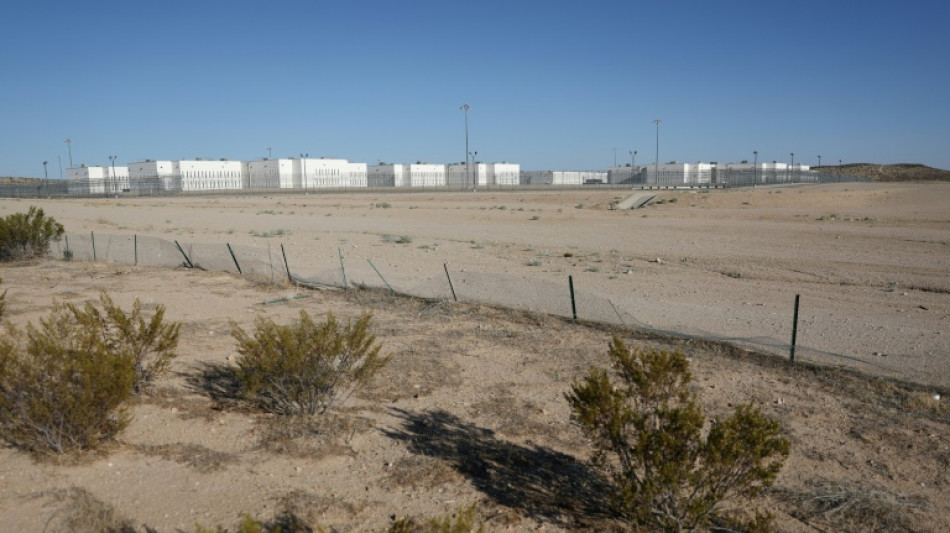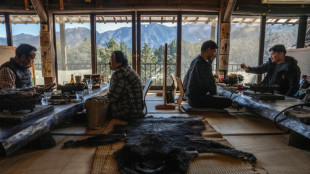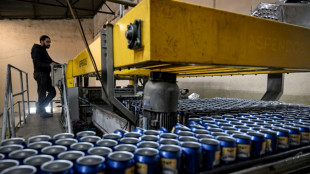

US migrant raids spark boom for private detention providers
Donald Trump's promise to carry out the largest deportation operation in US history has appalled some Americans. But others are cashing in on the boom in demand for private detention centers.
Migrants captured by Immigration and Customs Enforcement agents need to be temporarily housed in places like the facility being readied in California City, prior to deportation.
"When you talk to the majority of residents here, they have a favorable perspective on it," said Marquette Hawkins, mayor of the hardscrabble settlement of 15,000 people, 100 miles (160 kilometres) north of Los Angeles.
"They look at the economic impact, right?"
California City is to be home to a sprawling detention center that will be operated by CoreCivic, one of the largest companies in the private detention sector.
The company, which declined AFP requests for an interview, says the facility would generate around 500 jobs, and funnel $2 million in tax revenue to the city.
"Many of our residents have already been hired out there to work in that facility," Hawkins told AFP.
"Any revenue source that is going to assist the town in rebuilding itself, rebranding itself, is going to be seen as a plus," he said.
- Boom -
Trump's ramped-up immigration arrests, like those that provoked protests in Los Angeles, saw a record 60,000 people in detention in June, according to ICE figures.
Those same figures show the vast majority have no conviction, despite the president's election campaign promises to go after hardened criminals.
More than 80 percent of detainees are in facilities run by the private sector, according to the TRAC project at Syracuse University.
And with Washington's directive to triple the number of daily arrests -- and $45 billion earmarked for new detention centers -- the sector is looking at an unprecedented boom.
"Never in our 42-year company history have we had so much activity and demand for our services as we are seeing right now," Damon Hininger, executive director of CoreCivic, said in a May call with investors.
When Trump took office in January, some 107 centers were operating. The number now hovers around 200.
For Democratic politicians, this proliferation is intentional.
"Private prison companies are profiting from human suffering, and Republicans are allowing them to get away with it," Congresswoman Norma Torres told reporters outside a detention center in the southern California city of Adelanto.
At the start of the year, there were three people detained there; there are now hundreds, each one of them attracting a daily stipend of taxpayer cash for the operator.
Torres was refused permission to visit the facility, run by the privately owned GEO Group, because she had not given seven days' notice, she said.
"Denying members of Congress access to private detention facilities like Adelanto isn't just disrespectful, it is dangerous, it is illegal, and it is a desperate attempt to hide the abuse happening behind these walls," she said.
"We've heard the horrifying stories of detainees being violently arrested, denied basic medical care, isolated for days, and left injured without treatment," she added.
Kristen Hunsberger, a staff attorney at the Law Center for Immigrant Advocates, said one client complained of having to wait "six or seven hours to get clean water."
It is "not sanitary and certainly not... in compliance with just basic human rights."
Hunsberger, who spends hours on the road going from one center to another to locate her clients, says many have been denied access to legal counsel, a constitutional right in the United States.
Both GEO and ICE have denied allegations of mistreatment at the detention centers.
"Claims there is overcrowding or subprime conditions in ICE facilities are categorically FALSE," said Tricia McLaughlin, the assistant secretary at the Department of Homeland Security.
"All detainees are provided with proper meals, medical treatment and have opportunities to communicate with their family members and lawyers."
- 'Strategy' -
But some relatives of detainees tell a different story.
Alejandra Morales, an American citizen, said her undocumented husband was detained incommunicado for five days in Los Angeles before being transferred to Adelanto.
In the Los Angeles facility, "they don't even let them brush their teeth, they don't let them bathe, nothing. They have them all sleeping on the floor, in a cell, all together," she said.
Hunsberger said that for detainees and their relatives, the treatment appears to be deliberate.
"They're starting to feel that this is a strategy to wear people down, to have them in these inhumane conditions, and then pressure them to sign something where they could then agree to being deported," she said.
P.Hartmann--BVZ




